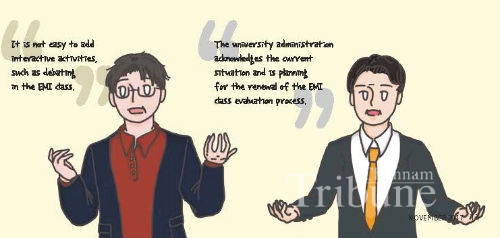In this article, you can listen to feedback from students on their satisfaction with English-Mediated Instruction courses at our university. – Ed.
Recently there has been research showing that English-Mediated Instruction (EMI) courses have a backwash effect on university students’ global competitiveness. The EMI courses, implemented in 2004 at Chonnam National University (CNU), are currently receiving feedback from learners that the system needs to be renovated. The number of international students studying at the university and Korean students who want to study abroad has been increasing. In this sense, lectures in English are necessary for both international and Korean students so as to prepare for their future careers. The Chonnam Tribune examined how EMI classes are conducted and also listened to feedback from international and Korean students and professors on their satisfaction with the courses.

English as the Medium of Instruction at CNU
In the 2017 fall semester, CNU is offering 540 EMI courses in diverse majors and liberal arts classes. These EMI classes are divided into two different types, Type A and Type B, depending on the proportion of English usage during class. Type A classes are English-only classes, so class materials and lectures are entirely 100 percent in English. Type B classes use both Korean and English during class. For type B classes, English language is used in lecture materials rather than being used to deliver lectures. Both types of lectures were made to control exposure to the language at different levels and to help students to successfully enhance their English skills and understand academic subjects.
The aim of EMI courses is simply ‘to kill two birds with one stone’. Educators want to enhance their students’ English skills as they teach subject matters by exposing students to English during the lecture. However, as the results of current studies show, if EMI is not conducted under proper conditions, the language itself could become a barrier to learn and worse the learner could fail to learn both, a subject and a language. The main problem that the students taking EMI classes have is quite similar to the one mentioned above. It is the language.
English as a Barrier for Korean Students to Learn Subject Matter
The reason why Korean students enroll for EMI classes varies. Some are taking the classes to prepare for studying abroad and others to learn English. The absolute evaluation system of type A EMI classes is also attracting students to take the classes, as most of them think it will be much easier to get a good grade with this system. According to the students who attended the classes for this purpose, EMI classes did help students to enhance their English skills and to get good grades as well. However, for the students who had to take the classes just because they were a requirement for their major or did not have another option as there was no an alternative Korean class, taking an EMI course was a tough task.
Most of the students we interviewed said that the most difficult part of the EMI class was English. A sociology majoring junior who took three Type B major classes said that it was quite hard to follow the class as class materials were in English. She added that her English reading skill improved after the lectures due to the heavy reading assignments; however, she was not sure about whether her communication skills or English abilities related to her major have improved as well. As Type B classes are a mixture of English and Korean, the language educational function became a subtle matter and students might feel that the language is interrupting their subject learning. This kind of feeling becomes more severe when it comes to Type A classes as they are only in English.
Kim Sung-khun (Professor, Institute of Liberal Education) said he spends more time preparing for EMI lectures compare to classes in Korean as he tries to find easy and better ways to deliver knowledge in English. He added that students tend to focus more on an EMI class as they have to pay attention to understand the lecture in English. However, as students are not used to communicate in English, it is not easy to add interactive activities, such as debating in the EMI class curriculum. So the burden of the class is centered on professors. ”It is time for us to think about the true meaning and goal of EMI classes,” he said.

Korean as Barrier for International Students to Learn Subjects
As of now, the proportion of foreign students in our school surpassed three percent of the total student population. Because most of them don’t speak English as their mother tongue, the biggest problem they are facing in EMI classes is that the language is also foreign to them. According to our school statistics data, only 6.25% of the international students meet the language skill requirement in 2017. The rate has decreased since 2015 and the statistics show that Type B EMI classes could be a burden for international students.
Most international students in the interview were quite satisfied with Type A; however, they felt difficulty with Type B classes. One freshman majoring in business administration said she was really satisfied with Type A classes as she was able to consolidate her English skills. An economics major whose native language is Uzbek also said that to him Type A classes are very helpful and easy to understand. However, he said that Type B was a bit obscure as the lecture was hard to understand, especially if professors use more Korean than English.
To Make Effective EMI Classes
In order to offer a more effective educational environment, our school has been collecting students’ opinion by using a lecture evaluation system at the end of each semester. However, as the questions are ambiguous and could not cover diverse opinions, it needs to be renovated. There should also be additional ways to listen to feedback from students and professors about the EMI lecture. The EMI courses need improvement in relation to its management. Kim Eun-il (Dean, Office of Academic Affairs) said, “Our school acknowledges the current situation and is planning for the renewal of the EMI class evaluation process.” He added that CNU will make intensive Korean learning classes for international students in the near future.
As the number of international students enrolling at CNU will increase and globalization continues, the need for EMI classes will also continue. So, to make better classes the school needs to listen to the students’ needs and to keep reflecting their opinions to develop the curriculum. We are hoping that this renovation could help to apply the students’ and professors’ opinion to the curriculum and help their language difficulties through the courses. There is still a need for additional changes like clarifying the definition of language percentages during the classes and structuring curriculums for EMI classes. Overall, EMI classes require systematic management and clear organizing. Therefore, CNU should manage the current ambiguity problem EMI classes are facing and provide better EMI courses for everyone.
By Na Mina, Student Editor

